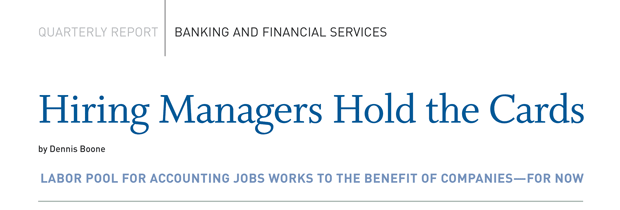Kansas City’s famed penchant for stability during tough economic times is showing up again in the accounting sector’s labor pool—and that’s good news for businesses looking to beef up their staffs. While qualified accountants are still in demand nationally, the long-established economic conservatism of businesses in this region has contributed to what accounting professionals here say is a buyer’s market for talent.
“If you’re in a hiring mode now or early into 2010, I think you’re in great shape,” said Barry Davis, managing partner for BKD, the Kansas City area’s second-largest public accounting firm. “There will be some very, very qualified candidates out there who may not have a job right now.”
That, in turn, he said, is going to put pressure on college placement officers, who in years past may have been able to brag about seeing 90 percent of their students off into jobs after graduation. “They are worried about their placement numbers,” Davis said. “They’re all struggling now, and that 90 percent may turn into 65 or 70 percent.”
Tomeka White, a senior recruiter for Qualstaff Resources, said changes in the labor pool were making it tough on two types of job-seekers: Inexperienced ones with college degrees, and even long-term accounting veterans who never finished their college coursework. That leaves experienced degree-holders in the best position to navigate the employment waters through the end of this recession.
“New graduates coming out of school with high expectations of getting on with a Big Four firm immediately, have to understand that it’s going to take some time,” White said. “The best thing a new graduate can do is partner with their career services department to find opportunities while in school—even unpaid internships, which will at least give them experience—because the days are gone when you could walk out of college into a $40,000-a-year job.”
But if, coming out of this grinding recession, your business will need to staff up in accounting, it might not hurt now to factor in some longer-term trends that could reshape the labor pool. Although the number of accounting jobs posted on Web sites nationally has declined since January 2008—by as much as 25 percent, according to PayScale.com—that will change.
The federal Bureau of Labor Statistics predicts a 16 percent increase in job openings for accountants by 2016, which suggests that companies with a long-term view would want to have staff in place before the need becomes most acute. That estimate may be a bit on the high side, but Davis said he did see competition for accounting talent picking up in the latter half of 2011.
Some observers believe demand will increase after next year’s expiration of the 2001 federal tax cuts, combined with the long-term effects of Sarbanes-Oxley, the 2002 legislation that imposed significantly more complex accounting practices on corporations as a response to the Enron scandal. Davis, though, believes any hiring influenced by either of those developments has already been built into the market.
One of the reasons that experienced, degreed accountants—even the ones idled by cuts in corporate staffing—find themselves in better positions than others who have been laid off is the dip in accounting majors that followed adoption of the so-called 150-hour rule in recent years. Nearly all states now require certified public accountants to have gone through 150 college credit hours. Faced with a significant additional expense, many students responded by pursuing other career paths.
Paradoxically, the economic downturn itself has helped maintain the need for accountants on a national level. The New York executive search firm A.E. Feldman says accounting firms need more people on staff to help clients re-define risk management structures, achieve better cash management, sell assets, optimize costs, restructure debt, and improve the depth and transparency of financial reporting. Nonetheless, the buyer’s market rules. As White observed: “Right now, companies have the luxury of being picky.”
